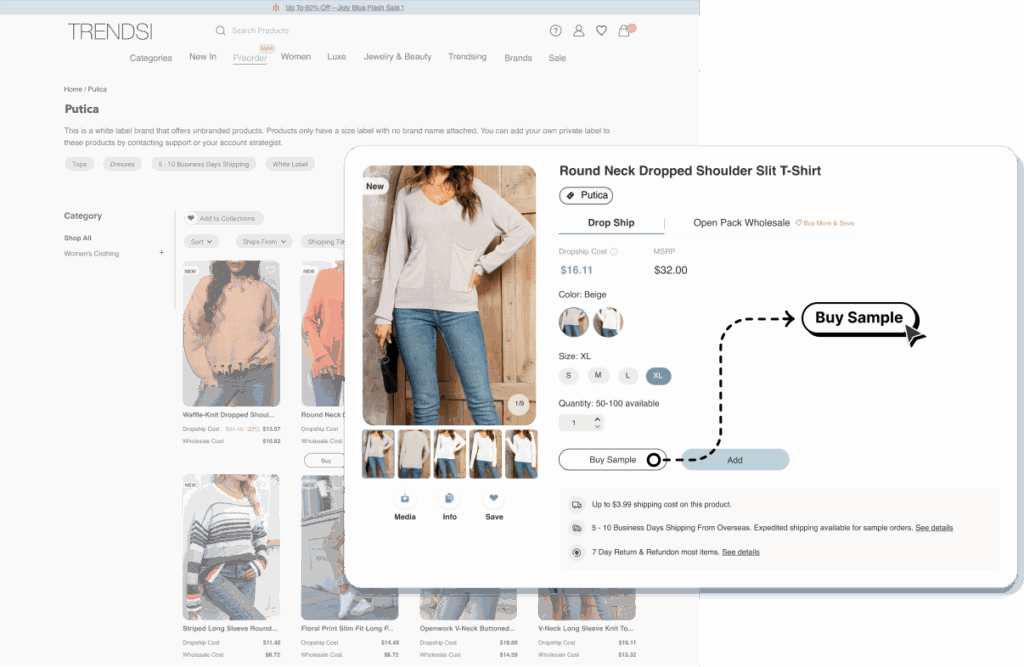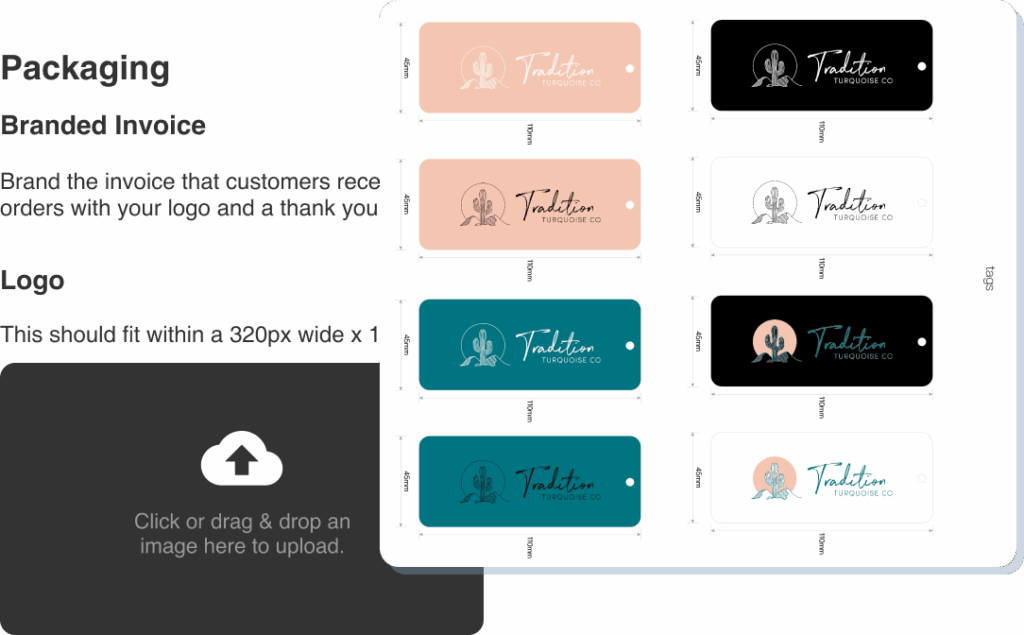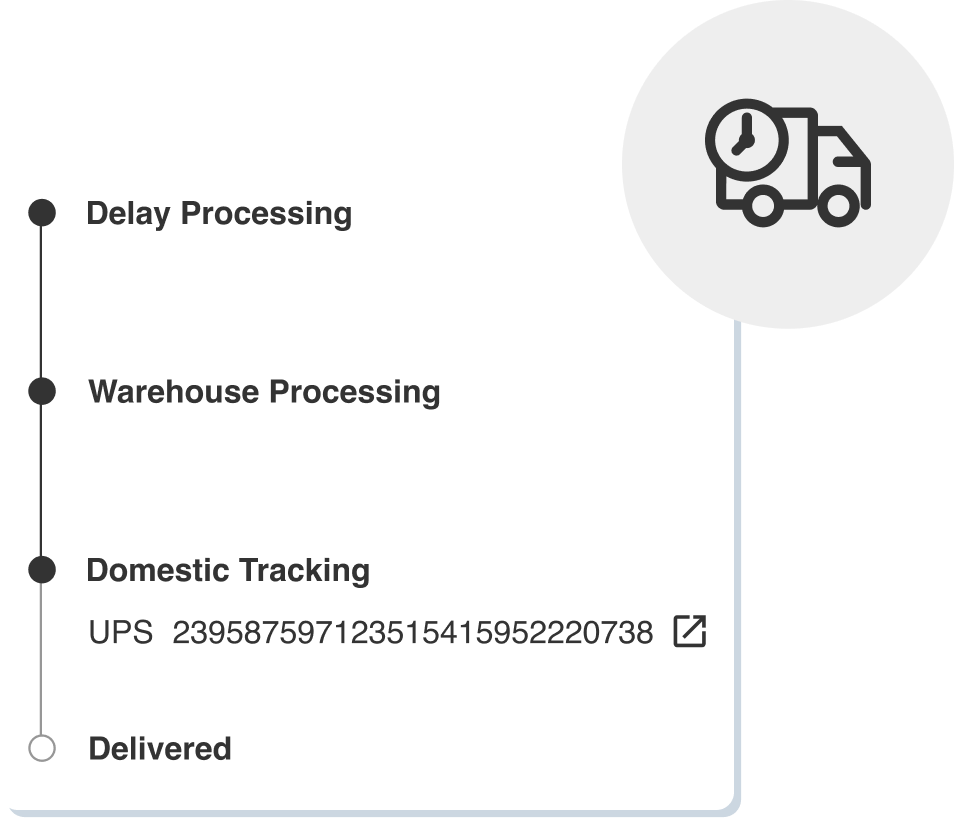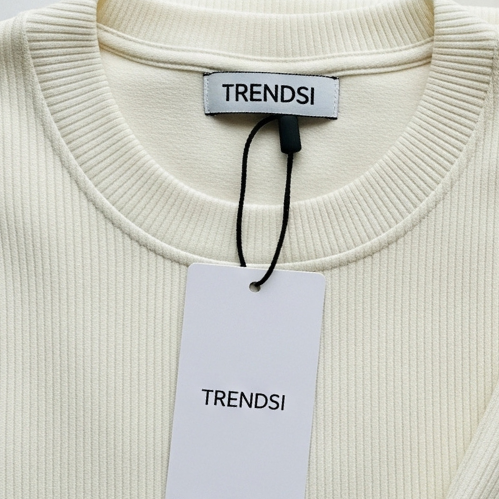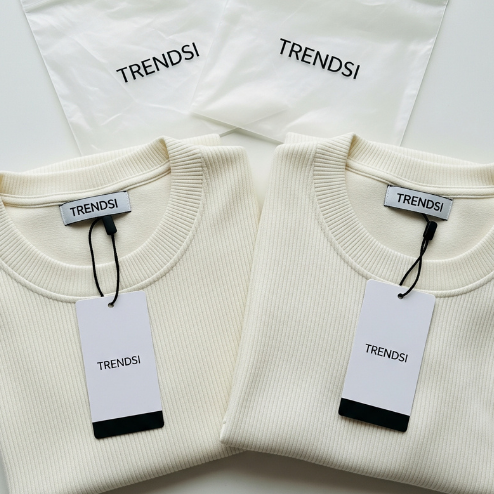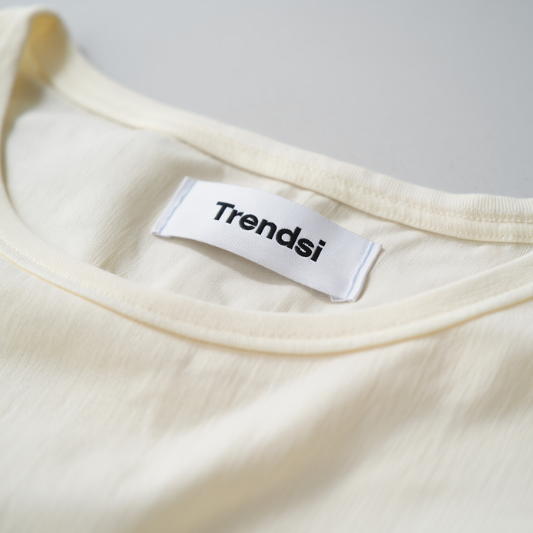You don’t need to invent something new to build a successful brand. Private label business models offer a smart way to create branded products without complex manufacturing.
This guide will show you how to start and grow a private-label business. You’ll learn proven strategies used by successful small business owners to develop quality products and build profitable brands.
This approach bridges the gap between reselling generic items and developing new products. Custom branding through wholesale partnerships gives you control over your brand identity while reducing investment risks.
Understanding Private Labeling and How It Works
Private labeling offers profitable opportunities for small entrepreneurs. Companies can sell high-quality products under their own brand name without manufacturing complexities. This model bridges established manufacturers and ambitious business owners entering the market.
The private labeling industry is growing rapidly. Products are manufactured by experienced companies while new brands focus on marketing. This arrangement benefits both parties and creates opportunities across various industries.
What Is Private Labeling
Private labeling involves manufacturers producing goods for retailers to sell under their own brands. The retailer becomes the brand owner while the manufacturer handles production. This allows businesses to offer exclusive products without investing in manufacturing facilities.
Major retailers use this model successfully. Target’s Goodfellow & Co. clothing line is an example of private labeling. Various manufacturers produce the products, but they carry Target’s exclusive brand identity.
Private labelers control branding, packaging, and marketing strategies. They work with manufacturers to customize products according to their specifications. This control helps businesses create unique market positioning and build customer loyalty.
Private Label vs White Label vs Store Brand
These three business models have key differences. Each approach offers distinct advantages and serves different business goals. Your choice depends on your brand strategy and market objectives.
White label products are generic items that multiple retailers can rebrand. Manufacturers create standard products for various companies to sell under different names. White-label products require minimal customization and offer quick market entry.
A store brand represents products sold exclusively by specific retailers. These items compete with national brands while offering better profit margins. Costco’s Kirkland Signature brand demonstrates this model’s effectiveness.
Private brands involve deeper manufacturer relationships and product customization. They often include exclusive formulations or designs. This exclusivity creates stronger competitive advantages and brand differentiation.
| Business Model |
Customization Level |
Exclusivity |
Investment Required |
Time to Market |
| White Label |
Minimal (packaging only) |
Non-exclusive |
Low |
1-2 weeks |
| Private Label |
High (formula/design) |
Exclusive |
Medium-High |
2-6 months |
| Store Brand |
Medium (specifications) |
Retailer exclusive |
Medium |
1-4 months |
| National Brand |
Complete control |
Fully exclusive |
Very High |
6-18 months |
How Private Labeling Works with Third-Party Manufacturers
The process starts by finding suitable manufacturers for your product category. Third-party manufacturers specialize in producing goods for other companies. These partnerships form the foundation of successful private label businesses.
Initial talks cover product specs, minimum orders, and customization options. Manufacturers assess your needs against their capabilities and schedules. This evaluation determines the long-term success of the partnership.
Quality standards and certifications are crucial in choosing manufacturers. Reputable ones maintain industry certifications and follow strict quality control. They know your brand reputation depends on consistent product quality.
Production involves several approval and testing stages. Manufacturers create samples based on your specifications for evaluation. Products are produced only after final approval of samples, packaging, and labeling designs.
Communication is key throughout the manufacturing relationship. Regular updates prevent delays and misunderstandings. Successful private labelers maintain strong ties with their manufacturing partners.
Payment terms and logistics coordination complete the operational framework. Most manufacturers require deposits before production starts. Understanding these financial needs helps businesses plan cash flow and inventory management effectively.
Key Benefits and Advantages of Private Labeling Products
Private labeling offers unique advantages over traditional reselling. It creates sustainable business growth opportunities beyond simple product sales. Entrepreneurs can use these benefits to build stronger market positions and achieve success.
These core benefits help business owners make informed product strategy decisions. Together, they create a comprehensive business model supporting growth and profitability.
Higher Profit Margins Compared to Resale Products
Private label products typically generate profit margins of 40-60%. This is much higher than the 10-20% margins common with resale products. Businesses can eliminate middleman costs and control their pricing strategies directly.
A clothing retailer selling branded jeans for $50 might make $10 profit. Their own private label brand jeans at $45 could generate $25 profit. This approach offers 150% more profit while giving customers better value.
Brand Control and Customization Options
Brand control is a key advantage of private labeling. Business owners decide on packaging design, ingredients, and marketing messages. This creates consistent brand experiences that build customer loyalty.
Customization options allow businesses to create products matching their target market needs. Companies can adjust formulations, colors, sizes, and features based on customer feedback.
Market Differentiation and Exclusive Products
Exclusive products provide ultimate competitive protection in crowded markets. Competitors can’t sell identical items because the products exist only under your brand name.
Market differentiation through private labeling allows businesses to target specific customer segments. Companies can develop unique products that address unmet needs in their markets.
Private labeling allows businesses to create product lines that complement each other perfectly. Companies can ensure consistent quality, design, and brand messaging across their entire product portfolio.
Private label brands can expand into new product categories more easily than traditional retailers. Established brand recognition and customer trust transfer to new products, reducing marketing costs.
These benefits help businesses grow your business through multiple revenue streams while building valuable brand equity. The strategic advantages create long-term competitive advantages that protect market position and profitability.
Getting Started with Your Private Label Business
Private label success involves three key phases. First, find reliable manufacturers. Second, select profitable products to sell. Third, meet legal standards. Each phase needs careful planning for a sustainable business.
Informed decisions are crucial from the start. Your manufacturer choice affects product quality, costs, and delivery times. Choosing the right products can shape your market position and profits.
Finding the Right Private Label Manufacturer
Picking the right private label manufacturer is vital. Your choice impacts product quality and brand reputation. Define your needs before contacting potential partners.
Consider factors like minimum orders, production capacity, and quality certifications. A good manufacturer should have strong quality control and transparent practices.
Researching Private Label Manufacturers
Start by exploring online directories and industry databases. Platforms like Alibaba and ThomasNet list manufacturers across various industries.
Check each label manufacturer’s business registration and customer reviews. Request references from existing clients. Thorough research now prevents costly mistakes later.
Join a private label manufacturers association for networking. These groups often provide member directories and valuable industry insights.
- Request product samples and evaluate quality standards
- Verify certifications and compliance documentation
- Assess communication responsiveness and language capabilities
- Compare pricing structures and payment terms
- Review production timelines and capacity limits
Working Directly with Manufacturers
When you work directly with manufacturers, set clear communication rules. Define quality specs, packaging needs, and delivery expectations in writing.
Build strong relationships through regular talks and site visits. Direct relationships often lead to better pricing and priority treatment.
Negotiate terms that protect you while being fair. Include quality guarantees and intellectual property protections in your agreements.
Popular Private Label Product Ideas for 2025
Several key categories show strong growth for online sellers. These product ideas have growing demand and reasonable entry barriers.
Focus on areas where you can stand out through quality or marketing. Success often comes from finding underserved niches in larger markets.
Skincare and Personal Care Products
Skincare products lead the beauty market. Consumers want natural and specialized formulas. The global skincare market may reach $189 billion by 2025.
Popular items include serums, moisturizers, and cleansers. Natural and organic formulas command higher prices in this category.
Consider focusing on specific skin concerns or demographics. Anti-aging products and acne treatments are in high demand.
- Vitamin C serums and anti-aging treatments
- Natural cleansers and exfoliating products
- Specialized moisturizers for different skin types
- Sun protection and after-sun care products
Pet Products and Accessories
The pet industry is growing as more people own pets. Pet products form a $261 billion global market with steady growth.
Create products for various pet types like dogs, cats, and small animals. Health supplements and grooming items are in demand.
Pet owners value quality and safety, making this ideal for premium brands. Natural ingredients appeal to eco-conscious buyers.
- Natural pet supplements and vitamins
- Grooming tools and shampoos
- Interactive toys and puzzle feeders
- Organic treats and specialty foods
Hair Care and Cosmetic Products
Hair care offers great private label chances. The market values products for damage repair and color protection.
Cosmetic products keep growing as buyers seek quality alternatives. Focus on clean beauty and inclusive shade ranges.
Target specific hair types to build loyal customers. Sulfate-free shampoos and natural styling aids are growing segments.
Legal Requirements and Quality Standards
Private labeling is legal, but compliance is key. Different products have specific rules for market entry.
FDA rules apply to cosmetics and personal care items in the US. Meet labeling, ingredient, and safety standards.
Use quality control to ensure high-quality products. Regular testing protects your brand and customers.
- Product labeling and ingredient disclosure requirements
- Safety testing and certification processes
- Import/export documentation and customs compliance
- Insurance coverage for product liability
- Trademark and intellectual property protections
Create quality checks to verify products meet all standards. Document these steps for inspections or audits.
Conclusion
Private-label businesses offer a proven path to sell products under your brand. This model requires careful planning but can be rewarding for committed entrepreneurs.
Start by choosing the best products from reliable manufacturers. Focus on one product category initially to learn and minimize risk.
Research manufacturers who make products for your target market. Look for partners with quality certifications and clear communication.
Many successful brands began with private label products in niche markets. They later expanded their range for various customer segments.
Store brand products compete directly with established companies. Your success depends on finding products that set your brand apart.
Opportunities exist across nearly every industry due to the wide range of private-label products. Start small, prioritize quality, and grow slowly.
Successful private label brands understand that patience and strategy are key. This approach is more effective than chasing quick profits.
FAQ
What is the difference between private label and white label products?
Private label products are made by third parties but sold under your brand name. You control product specs, ingredients, and marketing. White label products are pre-made generics that many retailers can rebrand. Private labeling offers more customization, while white labeling allows faster market entry.
How much money do I need to start a private label business?
Starting costs vary based on product category and scale. Most private label businesses need $5,000 to $25,000 initially. This covers minimum orders, packaging design, legal compliance, and initial marketing.
Skincare products often require higher investments due to regulations. Simpler products like pet accessories may have lower entry costs. Many entrepreneurs start small with one product and grow over time.
What are the best private label products to sell in 2025?
High-demand categories include skincare and personal care products, especially those with natural ingredients. Pet products are growing as pet ownership increases. Hair care products for specific concerns offer great opportunities.
Focus on consumable products that allow repeat purchases. Consider trending niches like sustainable packaging or specialized formulas for underserved markets.
Do I need special licenses to sell private label products?
Legal requirements depend on your product and location. Most businesses need a basic license and tax ID. Cosmetics require FDA compliance and proper labeling.
Food and supplements need extra certifications and may require facility inspections. Pet products must meet safety standards. Some categories need specific permits. Consult legal experts to ensure full compliance.
Can I sell private label products on Amazon and other marketplaces?
Yes, most major ecommerce platforms welcome private label products. Amazon, eBay, and Shopify allow private label sellers if products meet quality standards. Amazon’s Brand Registry offers extra protection for private labels.
Success requires competitive pricing, high-quality images, optimized listings, and strong customer service. These factors help build positive reviews and rankings.
What minimum order quantities should I expect from private label manufacturers?
Minimum order quantities (MOQs) vary by product type and manufacturer. Cosmetics often require 500-1,000 units minimum. Simpler products like accessories might need 100-500 units.
Some makers offer lower MOQs for new customers or charge setup fees. Factor MOQ requirements into your initial investment and cash flow plans.
How do I protect my private label brand from copycats?
Protect your brand through trademark registration and unique packaging design. Register your brand name and logo as trademarks. Create distinctive packaging that’s hard to copy exactly.
Establish exclusive deals with manufacturers when possible. Use non-disclosure agreements. Monitor marketplaces for fakes and take quick action through reporting systems and legal channels.

